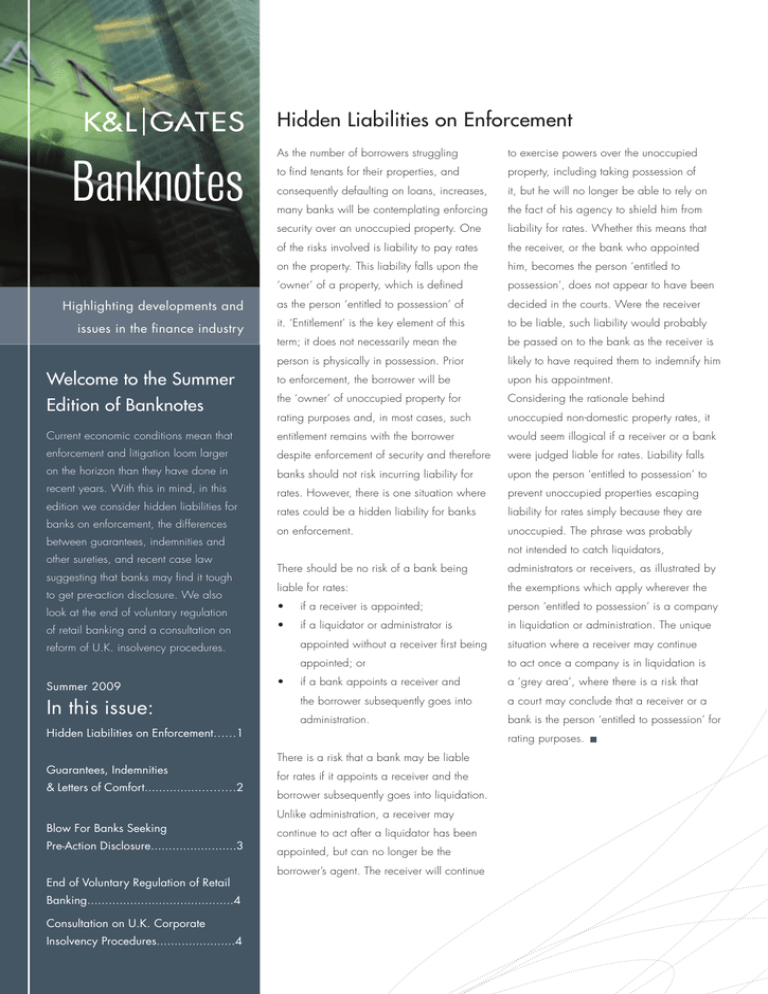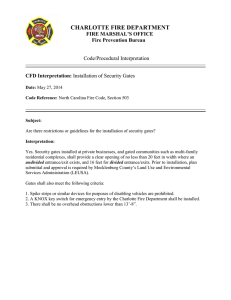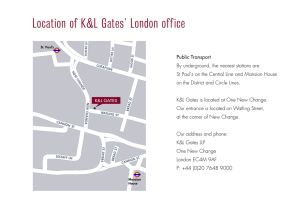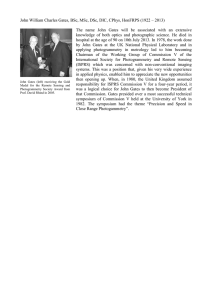
Hidden Liabilities on Enforcement
As the number of borrowers struggling
to exercise powers over the unoccupied
to find tenants for their properties, and
property, including taking possession of
consequently defaulting on loans, increases,
it, but he will no longer be able to rely on
many banks will be contemplating enforcing
the fact of his agency to shield him from
security over an unoccupied property. One
liability for rates. Whether this means that
of the risks involved is liability to pay rates
the receiver, or the bank who appointed
on the property. This liability falls upon the
him, becomes the person ‘entitled to
‘owner’ of a property, which is defined
possession’, does not appear to have been
Highlighting developments and
as the person ‘entitled to possession’ of
decided in the courts. Were the receiver
issues in the finance industry
it. ‘Entitlement’ is the key element of this
to be liable, such liability would probably
term; it does not necessarily mean the
be passed on to the bank as the receiver is
person is physically in possession. Prior
likely to have required them to indemnify him
Welcome to the Summer
to enforcement, the borrower will be
upon his appointment.
Edition of Banknotes
the ‘owner’ of unoccupied property for
Considering the rationale behind
rating purposes and, in most cases, such
unoccupied non-domestic property rates, it
Current economic conditions mean that
entitlement remains with the borrower
would seem illogical if a receiver or a bank
enforcement and litigation loom larger
despite enforcement of security and therefore
were judged liable for rates. Liability falls
on the horizon than they have done in
banks should not risk incurring liability for
upon the person ‘entitled to possession’ to
recent years. With this in mind, in this
rates. However, there is one situation where
prevent unoccupied properties escaping
rates could be a hidden liability for banks
liability for rates simply because they are
on enforcement.
unoccupied. The phrase was probably
Banknotes
edition we consider hidden liabilities for
banks on enforcement, the differences
between guarantees, indemnities and
other sureties, and recent case law
suggesting that banks may find it tough
to get pre-action disclosure. We also
look at the end of voluntary regulation
of retail banking and a consultation on
not intended to catch liquidators,
There should be no risk of a bank being
administrators or receivers, as illustrated by
liable for rates:
the exemptions which apply wherever the
•
if a receiver is appointed;
person ‘entitled to possession’ is a company
•
if a liquidator or administrator is
in liquidation or administration. The unique
appointed without a receiver first being
situation where a receiver may continue
appointed; or
to act once a company is in liquidation is
if a bank appoints a receiver and
a ‘grey area’, where there is a risk that
the borrower subsequently goes into
a court may conclude that a receiver or a
administration.
bank is the person ‘entitled to possession’ for
reform of U.K. insolvency procedures.
Summer 2009
In this issue:
Hidden Liabilities on Enforcement……1
Guarantees, Indemnities
& Letters of Comfort................………2
•
rating purposes.
There is a risk that a bank may be liable
for rates if it appoints a receiver and the
borrower subsequently goes into liquidation.
Unlike administration, a receiver may
Blow For Banks Seeking
Pre-Action Disclosure........................3
End of Voluntary Regulation of Retail
Banking.........................................4
Consultation on U.K. Corporate
Insolvency Procedures......................4
continue to act after a liquidator has been
appointed, but can no longer be the
borrower’s agent. The receiver will continue
Guarantees, Indemnities
& Letters of Comfort
A lender can take various assurances from
In ABP v Ferryways, the defendant ran ferry
The Court of Appeal disagreed with ABP’s
third parties in respect of a borrower’s
services and contracted with the claimant
arguments, finding instead that the nature of
performance of its obligations:
to receive loading and unloading services
MSC’s obligation was that of a guarantee,
•
A guarantee is a promise from a third
party to fulfill the obligations of another
if that other fails to do so. It is contingent and is therefore a secondary
obligation, liable to be discharged by
variations to the original obligations if
made without the guarantor’s consent.
•
•
An indemnity is a promise from a
third party to satisfy the obligations of
in return for fees. ABP received a letter from
because the letter framed MSC’s obligations
another, but is not contingent upon, and
MSC Belgium NV (“MSC”) (of the same
by reference to Ferryways’ obligations under
is enforceable independently of, the
corporate group as Ferryways) stating that
the original contract. As a result, MSC was
original obligations to which it relates.
MSC would ensure that Ferryways would
discharged from any liability under the letter
It is therefore not at risk of being
“at all times” have enough funds and
by the extension of time given to Ferryways
discharged by variation of the original
resources to meet its liabilities under the
to which it had not consented.
obligations.
contract and that Ferryways would meet its
Letters of comfort are written assurances
liabilities under the contract when they fell
which vary in form and substance from
due. When a payment dispute arose ABP
case to case, which may or may not be
gave Ferryways more time to pay. MSC’s
legally binding.
consent to this amendment was not sought.
The differences between various types
of third party assurances set out above
Ultimately, ABP brought proceedings against
Ferryways and against MSC under the letter.
Comment
The case illustrates the importance of
ensuring that all parties are aware of the
nature of their obligations, especially when
set out in a less formal structure, such as
a letter. It highlights the risk posed by
ambiguous drafting that assurances received
mean that whenever a bank takes such
ABP argued that MSC’s letter was an
by a bank or other beneficiary may be
an assurance in respect of a borrower’s
indemnity, or other contract imposing a
worthless if and when it needs to call upon
obligations, it is in all parties’ interests to
primary liability on MSC. ABP emphasised
them. It also demonstrates the importance of
ensure that the nature of that assurance
the words “at all times” as evidence that
obtaining a guarantor’s consent to variations
is clearly set out in whatever document
MSC’s liability was not contingent upon
to a guarantee and, wherever possible,
constitutes the assurance, as highlighted by
Ferryways’ failure to meet its liabilities and
combining a guarantee with a primary
the Court of Appeal in Associated British
therefore could not be a guarantee.
obligation such as an indemnity, which will
Ports v Ferryways NV & Anor ([2009]
EWCA Civ 189).
2
this case highlights the risk posed by
ambiguous drafting that assurances
received by a bank or other beneficiary may
be worthless
Banknotes
be done in most bank guarantee documents.
Blow For Banks Seeking
Pre-Action Disclosure
Current market conditions are resulting in
LB declined to buy back the LSS notes. As
In this case, the tapes were sufficient to
more disputes between banks and other
a result, Anglo incurred a US$ 42.74m
enable Anglo to plead its claim. The Court
financial institutions. A prospective claimant
loss. Anglo hoped to pursue a claim against
thought it would be rare to order pre-action
may reduce the risk and cost of litigation
West LB for negligent misrepresentation.
disclosure by one of the institutions of its
by seeking pre-action disclosure from the
prospective defendant. If such disclosure is
not given voluntarily, a prospective claimant
can apply to court. This was the course
taken by Anglo Irish Bank in a case that was
heard in February 2009.
Anglo sought pre-action disclosure of
communications between West LB and
the BH2 note-holder relating to the early
redemption of the BH2 Notes. This went to
West LB’s knowledge of the note-holder’s
The Court noted that deals in financial
instruments are often entered into between
institutions with relatively limited documentation
but conversations are taped.
internal documentation relating to the deal.
It was one thing to require mutual disclosure
during proceedings, but another to impose
disclosure on one party before proceedings
began. The Court also doubted whether the
disclosure sought would really resolve the
merits of the case, considering that it might
only raise more questions.
Comment
On the basis of this case, claimant banks
will find it more difficult to obtain pre-action
disclosure against other banks and financial
The underlying claim arose from West LB’s
intentions at the material time. Anglo also
institutions. Claimant banks will need to rely
sale of US$55,625,000 of derivative
sought communications within West LB
on the evidence in their own hands when
instruments to Anglo. These derivatives, the
regarding the repurchase of the LSS Notes.
conducting a risk benefit analysis before
“LSS Notes”, were linked to another note
Both these categories of documents were
commencing proceedings. Defendant banks
issue, the “BH2 Notes”.
central to the strength of Anglo’s case.
will have the comfort of knowing that they
It was alleged that West LB had
The Court was not persuaded that this
represented to Anglo that the BH2 Notes,
was an appropriate case for pre-action
and therefore the LSS Notes, would be
disclosure. The fact that the parties were
redeemed by the end of March 2007.
financial institutions was significant.
Further, that even if the BH2 Notes were not
The Court noted that deals in financial
redeemed, West LB would buy back the LSS
instruments are often entered into
Notes at par. In the event, the redemption
between institutions with relatively limited
of the BH2 Notes was revoked and West
documentation but conversations are taped.
are less likely to have to provide disclosure
on a pre-action basis.
Summer 2009
3
End of Voluntary
Regulation of Retail
Banking
Consultation on U.K. Corporate
Insolvency Procedures
On 15 June 2009, the Insolvency Service published a consultation paper proposing
certain changes to U.K. corporate insolvency regimes, inviting responses by September.
On 1 November 2009, the voluntary
The proposals seek to promote the use of company voluntary arrangements (CVAs) and help
banking codes which currently regulate the
companies in CVA or administration to find finance to assist their rescue. The proposals
U.K.’s retail banking sector will be replaced
include:
by compulsory regulation in the form of the
•
FSA’s retail banking conduct of business
the extension of CVA moratorium provisions, which are currently only available to small
companies, to all companies;
sourcebook (“BCOBS”) which will apply,
•
among others, to U.K. authorised banks and
introducing a general moratorium (maximum 3 months) available on application to court
by any company that cannot pay its debts as they fall due, designed to provide com-
building societies. Firms subject to BCOBS
panies with time in which to formulate CVA proposals in the knowledge that creditors
will need to ensure that their internal and
cannot take action against them;
customer facing processes and documents
•
are compliant, ideally before 1 November,
allowing companies in CVA or administration to create fixed charges over their assets
in order to obtain ‘rescue finance’. Depending on the terms of the ‘rescue finance’, new
because the FSA has indicated that only
charges may be subordinate to existing security, rank alongside it, or in priority to it.
a very limited transitional period will be
The consent of lenders holding existing charges would be required, or, if such consent
allowed. The replacement of a voluntary
is not forthcoming, a court order overriding the lender’s objections; and
regime with compulsory regulation should
•
provide consumers with greater certainty
limiting the assets caught by floating charges and asset based lending agreements to
assets acquired before insolvency.
about the retail banking services they use
and the comfort of knowing that the FSA
K&L Gates Outsourcing Practice
has greater power to impose dissuasive
punishment on non-compliant service
providers than the current Banking Code
At K&L Gates, we provide clients with advice on outsourcing transactions
Standards Board. However, BCOBS will
ranging from traditional IT outsourcing to cutting edge strategic
only apply to current and savings accounts.
partnerships and offshore outsourcing arrangements. As a result we are
Credit products will continue to be regulated
ranked among the top five global outsourcing legal advisors. The firm
by the OFT, but it is not clear whether
is also a member of the National Outsourcing Association in the U.K..
those parts of the banking codes relating to
Please contact Howard Kleiman (howard.kleiman@klgates.com or
consumer credit will continue to have effect
+44 (0)20 7360 8142) for further information about our outsourcing
and, if so, how they will be enforced.
practice in London.
For further information, contact:
Richard Hardwick, +44.20.7360.8125, richard.hardwick@klgates.com
Anchorage Austin Beijing Berlin Boston Charlotte Chicago Dallas Dubai Fort Worth Frankfurt Harrisburg Hong Kong London Los Angeles Miami Newark New York Orange
Anchorage
Austin
Beijing
Berlin
Boston
Charlotte
Chicago
Dallas
Dubai
Fort Worth
Frankfurt
Harrisburg
Hong Kong
London
County Palo Alto Paris Pittsburgh Portland Raleigh Research Triangle Park San Diego San Francisco Seattle Shanghai Singapore Spokane/Coeur d’Alene Taipei Washington, D.C.
Los Angeles
Miami
Newark
New York
Orange County
Palo Alto
Paris
Pittsburgh
Portland
Raleigh
Research Triangle Park
San Diego
San Francisco Seattle Shanghai Singapore Spokane/Coeur d’Alene Taipei Washington, D.C.
K&L
Gates is a global law firm with lawyers in 33 offices located in North America, Europe, Asia and the Middle East, and represents numerous GLOBAL
500, FORTUNE 100, and FTSE 100 corporations, in addition to growth and middle market companies, entrepreneurs, capital market participants and
K&L Gates is a global law firm with lawyers in 33 offices located in North America, Europe, Asia and the Middle East,
public
sector entities.
For more
information, visit
www.klgates.com.
and represents
numerous
GLOBAL
500, FORTUNE
100, and FTSE 100 corporations, in addition to growth and middle
market companies, entrepreneurs, capital market participants and public sector entities. For more information,
K&L
comprises multiple affiliated partnerships: a limited liability partnership with the full name K&L Gates LLP qualified in Delaware and maintaining offices throughout the U.S., in Berlin and Frankfurt,
visitGates
www.klgates.com.
Germany, in Beijing (K&L Gates LLP Beijing Representative Office), in Dubai, U.A.E., in Shanghai (K&L Gates LLP Shanghai Representative Office), and in Singapore (K&L Gates LLP Singapore Representative
Office);
a limited
liability
partnership
(also
named K&LaGates
incorporated
in England
maintaining
offices
London and
Paris; a Taiwan
general partnership
(K&L Gates) maintaining an office in
K&L Gates
comprises
multiple
affiliated
partnerships:
limitedLLP)
liability
partnership
with theand
full name
K&L Gates
LLPinqualified
in Delaware
and maintaining
offices
throughout
United
States,
in Berlin
and Frankfurt,
Germany,
in Beijing
(K&L Gates
LLP Beijing
Representative
Office),maintains
in Dubai,appropriate
U.A.E., in Shanghai
(K&L
Taipei;
and the
a Hong
Kong
general
partnership
(K&L Gates,
Solicitors)
maintaining
an office
in Hong
Kong. K&L Gates
registrations
in Gates
the jurisdictions in which its offices are located. A
LLPofShanghai
Representative
Office),
and in for
Singapore;
limited
liability
partnership
list
the partners
in each entity
is available
inspectiona at
any K&L
Gates
office. (also named K&L Gates LLP) incorporated in England and maintaining offices
in London and Paris; a Taiwan general partnership (K&L Gates) maintaining an office in Taipei; and a Hong Kong general partnership (K&L Gates, Solicitors)
maintaining an office in Hong Kong. K&L Gates maintains appropriate registrations in the jurisdictions in which its offices are located. A list of the partners in each
This publication is for informational purposes and does not contain or convey legal advice. The information herein should not be used or relied upon in regard to any particular facts or circumstances without
entity is available for inspection at any K&L Gates office.
first consulting a lawyer.
This publication is for informational purposes and does not contain or convey legal advice. The information herein should not be used or relied upon in regard to
©2009
K&L Gates
All Rights Reserved.
any particular
factsLLP.
or circumstances
without first consulting a lawyer.
©2009 K&L Gates LLP. All Rights Reserved.





